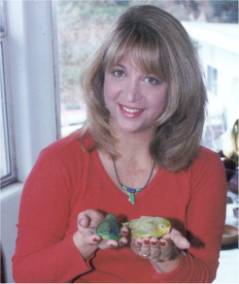Hi Sandee,
It's been a while since we last communicated so I wanted to give you an update. I had an appointment with Dr. M and he was very helpful. He is convinced my bird has fatty liver disease and he sent me some instructions and supplements for her. She is doing pretty well but she seems to be itchy and picking in certain areas (oil gland area, left cere, and upper hinge/shoulder of her wings. There are small patches of feathers missing) Also the rest of her plumage is very dull and scruffy. She gets sleepy easily but she eats and plays and interacts with me normally which is good. So my question for you today is... what season do parrotlets typically go through their molt? I'm hoping that when she molts, maybe she'll get some healthy new feathers in because of her new diet & vitamins, so I am anxiously waiting to see pin feathers come up... But wondering if maybe they don't molt when their little immune systems are compromised.
Whenever you get a chance, please let me know what you think.
Thank you so very much,
Betsy
Dear Betsy:
Molts can be influenced by many factors and it really doesn’t have anything to do with species. Age, hormones, lighting, heat, daylight hours and the seasons can trigger molts. Basically, most parrotlets go through their first molt at 4-6 months of age and then they usually molt twice a year after that. Generally, as the days get longer or shorter (or if you artificially add or subtract daylight hours) can cause a bird to molt. So can higher temperatures, including artificial heat.
I have articles in my books on how to deal with molting parrotlets, however, in your case, because your bird’s health situation, I would not change the diet as is recommended to provide more protein and fat. Both of those things are bad for birds with liver issues. I would discuss this issue with your vet. After all, missing or unhealthy feathering may be unsightly but it won’t adversely affect your bird’s health. Controlling fatty liver and not exacerbating the problem is much more important than worrying about the molt. In fact, the fatty liver may be the reason the bird is having such a hard time with molting. But again, you need to discuss it with your vet.
Sincerely yours,
Sandee L. Molenda, C.A.S.
The Parrotlet Ranch, Owner, www.parrotletranch.com
Join the International Parrotlet Society, – the World’s Largest and Oldest Parrotlet Organization www.internationalparrotletsociety.org
A Chattering Bird Builds No Nest.
Camaroonian Phrase
Subscribe to:
Post Comments (Atom)




No comments:
Post a Comment
Note: Only a member of this blog may post a comment.